By LISA EISENHAUER
FERGUSON, Mo. — One of the people who stopped by the Mercy Clinic Primary Care – Ferguson within the first few weeks of its opening in late July was a Black man who couldn't find a doctor who would accept his insurance.

Easterling
"He felt right off the bat, he's been incarcerated, he's diabetic, he's not going to get any medical attention, any medical help," recalled Sophia Easterling, the practice manager of the clinic in suburban St. Louis. "I'm like, 'We definitely can help you. We can figure something out. Don't just give up.'"
She made him an appointment to see one of the clinic's clinicians to assess his health.
When he came to his first appointment, he was asked, like all new patients, to fill out a questionnaire on various needs, including whether he is able to afford his medications and whether he has stable housing. His answers were shared with his care providers as well as with a community health worker who is based at the clinic to help meet patients' social needs.
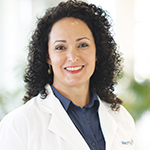
Thompson
Easterling and her colleague Victoria Thompson, a nurse practitioner, said the man was exactly the sort of underserved patient that Mercy hoped to reach when it opened the clinic in the predominantly low-income African-American community. Its staff also includes a full-time primary care physician and a licensed social worker.
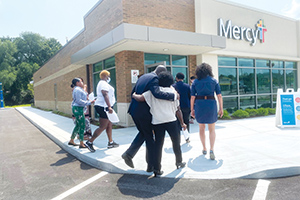
People enter the Mercy Clinic Primary Care – Ferguson in Missouri for a tour after the ribbon cutting and blessing in July. The clinic is part of a revival underway in the footprint of the sometimes-violent protests against racism and police violence that followed the 2014 fatal shooting of 18-year-old Michael Brown. Lisa Eisenhauer/© CHA
The clinic's goal is to offer immediate assistance by way of primary care and to help patients with long-term needs, such as disease management and accessing prescription or rental assistance.
Thompson said the clinic staff wants patients to know "We see you, we hear you. We want to be partners in giving you the care you need."
Promises kept
Donn Sorensen is executive vice president of operations at Mercy and chairman of the board and chief executive of Health + Homes, a nonprofit he set up with a handful of area business leaders and that Mercy financially supports. The nonprofit's mission is "to provide access to healthy lifestyles and neighborhoods and affect change for those who seek to strengthen their community through the inclusion of all persons."
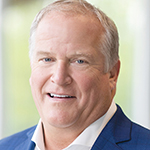
Sorensen
Sorensen said at the clinic's ribbon cutting that Mercy made a commitment to residents of Ferguson to help them transform their community. That pledge came in the wake of the sometimes violent and fiery protests that followed the police killing of Michael Brown, an unarmed Black teenager, in the summer of 2014. The outrage Brown's death unleashed, and the government's show of force to quell protests, put Ferguson in the national spotlight and propelled the Black Lives Matter movement. Sorensen told the audience that Mercy's commitment to the city is being realized through the clinic and the work of Health + Homes.
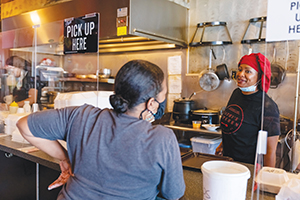
Cathy Jenkins, owner of Cathy's Kitchen, speaks with a customer at her restaurant in Ferguson, Missouri. The popular restaurant withstood the turmoil that roiled the city on the outskirts of St. Louis following the fatal police shooting of Michael Brown. Civic and nonprofit groups are leading a turnaround in the protest-scarred section of the city.
Whitney Curtis/© CHA
Health + Homes' first project has been to improve the largely commercial section of Ferguson along West Florissant Avenue that includes the site of the clinic. For months after Brown's death, protesters took over the street daily. Although the protests were largely peaceful by day, there were incidents of looting and arson at night. The distressed community found itself at the center of national discussions about police violence and racial injustice and disparities.
Data from the Centers for Disease Control and Prevention show the average life expectancy for Ferguson residents is in the low- to mid-70s, 10-15 years below that of some other parts of St. Louis County. Census data puts the median household income in Ferguson at $40,000, compared to $67,420 for the county.
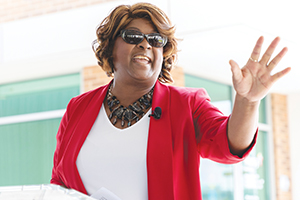
Mayor Ella Jones speaks during the opening ceremonies for the Mercy Clinic Primary Care – Ferguson in July. She sits on the community council that advises Mercy on clinic services. She said she expects the clinic "will benefit the residents of Ferguson for decades and generations to come."
Lisa Eisenhauer/© CHA
In recent years Health + Homes has spearheaded efforts to get grant funding for infrastructure improvements, including $10 million in federal funding announced in July that will go toward adding gutters, curb cuts and bus shelters on West Florissant Avenue.
"You all can remember what this block looked like many years ago," Sorensen told the crowd of local leaders and activists at the clinic's official opening. "It was our passion and promise to improve this area and I'm so grateful that we can continue to keep promises."
Investing in revival
Mercy spent $2.8 million to construct and equip the 5,500-square-foot clinic. It is one of several new buildings on West Florissant Avenue.
A $12.4 million, 26,000-square-foot Boys & Girls Club that opened in August 2019 is next door. The Ferguson Community Empowerment Center opened in 2017 by the Salvation Army and Urban League of Metropolitan St. Louis is three blocks away. That center, which offers a range of services such as job placement and children's programs, was built on the site of a convenience store that burned down in 2014 during the protests.
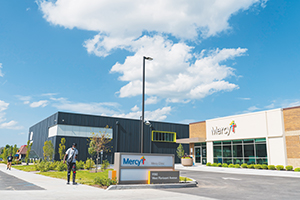
Mercy Clinic Primary Care – Ferguson is next to the Teen Center of Excellence opened in 2019 by the Boys & Girls Clubs of Greater St. Louis on West Florissant Avenue in Ferguson. The latter organization says the club serves a population that desperately needs safe places, positive mentors and life enhancing programs."
Whitney Curtis/© CHA
Speaking before the blessing of the Mercy clinic, Ferguson Mayor Ella Jones called it "an opportunity for collaboration, for partnership, for cooperation that will benefit the residents of Ferguson for decades and generations to come."
Jones is a member of a community council that Mercy set up to advise the health system, which is based in the St. Louis suburb of Chesterfield, on the design of the clinic and what services should be offered there.
Stakeholder buy-in
The clinic's main services are adult and pediatric primary care and women's health care. Its other services, some of which were still being added in mid-August, are:
- A nutrition center with a nutritionist on-site one day a week to advise on eating for disease management and wellness.
- A licensed clinical social worker coordinating with the Mercy psychiatry team to ensure patients receive quick access to care from behavioral health providers.
- Education offerings such as parenting classes, care for the caregiver opportunities, smoking cessation classes, and grief counseling.
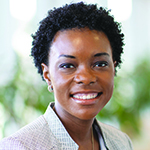
Jewell
Tesh Jewell, vice president of operations for adult primary care for Mercy St. Louis, facilitates the community council, which met monthly for much of the last two years.
The Ferguson council has representatives from various stakeholder groups, including local governments, businesses and schools. It remains in place to advise Mercy on the clinic's operations, though it is no longer meeting monthly.
Jewell said the council helped Mercy better understand the specific needs of Ferguson residents. She credits the council with persuading Mercy to add the wraparound services at the clinic that address patients' social needs. "I'll be honest, we didn't have the same rich understanding about the priorities of the community until after we engaged with our council," she said.
Jewell expects the community council model or some similar community-engagement effort to be used in the planning of future Mercy projects.
"Ferguson's process worked for Ferguson," Jewell said. "I can't say it would work for every other community but how we get that community input I think is something we have to continue to master and evolve for any project's unique needs."
Committed to community
In the first weeks of operation, appointments at the Ferguson clinic are filling up with walk-ins and others who book ahead. Easterling and the clinic's community health worker are helping with outreach, by setting up tables with brochures at community events and popping into nearby businesses to talk up the clinic's services.
The clinic takes appointments until 6:20 p.m. three nights a week and is open one Saturday a month to offer access to workers who can't take time off during the workday.
Thompson said she and the clinic's primary care physician, Dr. Nana Atsina, have worked at other Mercy facilities near Ferguson and are in the community by choice and plan to stay there.
"We all know the scars that are in this area from everything that happened," she said. "But we want everybody to know that we're making a commitment here."